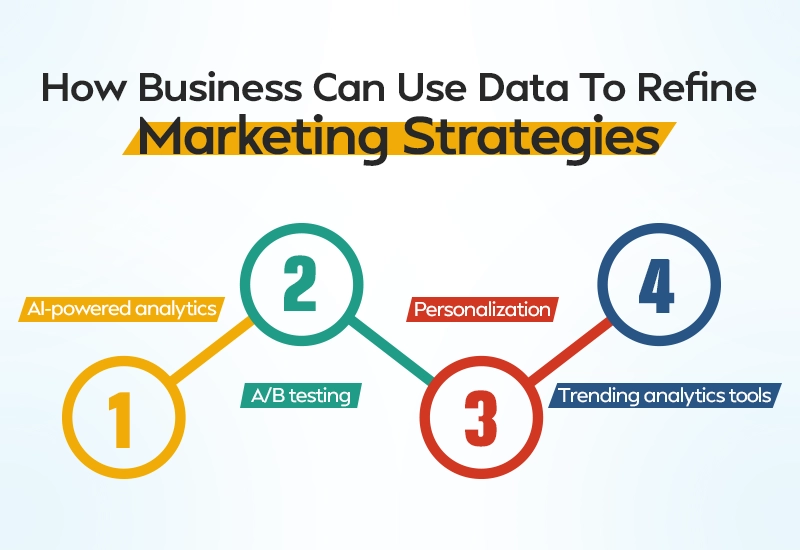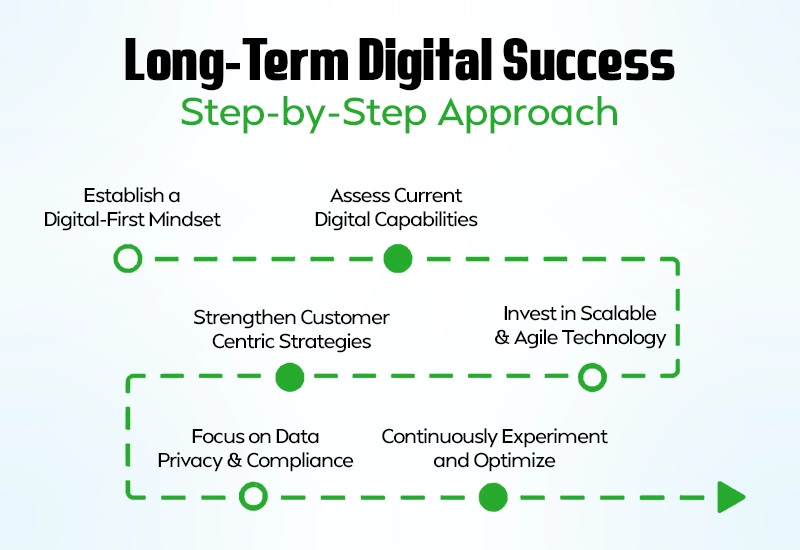
14 Apr 2025
As we move into 2025, digital transformation is redefining the landscape of digital marketing. Businesses that leverage emerging technologies—such as AI-powered automation, cloud-based marketing platforms, data analytics, and IoT-driven insights—can create more personalized, efficient, and impactful marketing strategies. To remain competitive, digital marketers must adopt the latest trends that enhance customer engagement, ad performance, and conversion optimization.
For businesses looking to optimize their digital marketing strategies, VelozMatrix offers expert solutions in SEO, performance ads, social media management, branding, and business process outsourcing.
Contact us to take your digital marketing to the next level.
AI in Digital Marketing: The Future of Automation and Personalization
AI in Digital Transformation is revolutionizing marketing with automation, predictive analytics, and hyper-personalization. According to Digital Marketing Institute, 92% of businesses across sectors plan to invest in generative AI tools within the next three years.
Key applications of AI in digital marketing:
AI-Powered Automation: Automating tasks like content scheduling, ad placements, and customer responses.
Predictive Analytics: AI-powered tools forecast campaign performance, audience behavior, and conversion probabilities.
Chatbots & Virtual Assistants: Enhance customer engagement by offering real-time, personalized assistance.
AI-Driven Content Creation: Platforms like ChatGPT, Jasper AI, and Copy.ai help create data-backed, SEO-friendly content at scale.
AI-Powered Ad Targeting: Google Performance Max, Facebook Advantage+, and Albert AI optimize ad placements and budgets for better ROI.
Cloud Computing: Enhancing Digital Marketing Scalability
Cloud computing enables marketing teams to leverage SaaS-based solutions for better scalability, cost-effectiveness, and remote accessibility. As per Statista, global end-user spending on public cloud services will reach approximately $825 billion by 2025.
How cloud computing benefits digital marketing:
Marketing Automation Platforms: Tools like HubSpot, Marketo, and Salesforce streamline campaign management.
Cloud-Based Analytics: Google Cloud, AWS, and Microsoft Azure provide real-time data insights for better decision-making.
Website Performance Optimization: Faster load times and seamless hosting improve SEO rankings.
CDN and Hosting Solutions: Cloudflare, AWS CloudFront, and Akamai help boost website performance.
Cybersecurity in Digital Marketing: Protecting Customer Data
With stricter data privacy laws (GDPR, CCPA), businesses must focus on cybersecurity in the digital era. Spacelift states that 94% of businesses observed improvements in their security after moving to the cloud.
Essential cybersecurity strategies for digital marketers:
Zero Trust Security: Ensuring customer data protection in digital campaigns.
Data Compliance: Adhering to privacy laws to maintain trust and avoid penalties.
Secure Payment Gateways: Essential for e-commerce and online transactions.
Cybersecurity Tools: Norton Security, McAfee, and Bitdefender help safeguard marketing databases.
Data-Driven Decision Making in Digital Marketing
Data analytics drives marketing success by offering insights into customer behavior, engagement metrics, and ROI tracking. Today, almost every other marketer relies on data analytics for creating new strategies or making amendments in the present ones.

How businesses can use data to refine marketing strategies:
AI-Powered Analytics: Predictive insights for better campaign performance.
A/B Testing: Optimizing ads, landing pages, and content strategies.
Personalization: Using real-time customer behavior analysis for targeted marketing.
Trending Analytics Tools: Google Analytics 4 (GA4), Tableau, Looker, and SEMrush provide in-depth campaign insights.
IoT in Digital Marketing: A New Era of Customer Engagement
The Internet of Things (IoT) is creating opportunities for real-time and hyper-personalized marketing. The usage of chatbots without human intervention for customer support is increasing, enhancing efficiency and customer service.
How IoT is transforming digital marketing:
Voice Search Optimization: Adapting SEO strategies for smart assistants like Alexa and Google Home.
Location-Based Marketing: Using IoT and beacons to deliver personalized offers.
Smart Advertising: IoT-generated data helps businesses tailor ads based on real-time consumer behavior.
IoT Marketing Tools: IBM Watson IoT, Google Firebase, and Cisco Kinetic help businesses analyze and act on IoT-generated insights.
Business Process Outsourcing (BPO) in Digital Marketing
Outsourcing marketing functions allows businesses to scale operations while focusing on core activities. Companies like VelozMatrix offer business process outsourcing (BPO) services to help businesses handle digital marketing effectively.
Why outsourcing digital marketing is a game-changer:
Cost Savings: Hiring remote digital marketing experts is more affordable than in-house teams.
Access to Global Talent: Leverage expert SEO specialists, ad managers, and content creators.
Scalability & Flexibility: Easily adjust marketing efforts based on business needs.
Outsourcing Platforms: Upwork, Fiverr, and Toptal connect businesses with marketing specialists worldwide.
How Businesses Can Prepare for Long-Term Digital Shifts – A Step-by-Step Approach

Follow this step-by-step approach to ensure long-term digital success:
Step 1: Establish a Digital-First Mindset
Foster a culture where digital innovation is encouraged at all levels.
Train employees in emerging technologies like AI, automation, and data-driven marketing.
Step 2: Assess Current Digital Capabilities
Conduct a digital audit to evaluate existing tools, platforms, and marketing strategies.
Identify gaps in technology, customer engagement, and data utilization.
Step 3: Invest in Scalable and Agile Technology
Shift to cloud-based marketing platforms for flexibility and seamless integration.
Implement AI-powered analytics to improve campaign performance and customer insights.
Step 4: Strengthen Customer-Centric Strategies
Adopt personalized marketing by leveraging first-party data.
Enhance customer experience (CX) across multiple digital touchpoints, ensuring a seamless omnichannel approach.
Step 5: Focus on Data Privacy and Compliance
Stay updated on global privacy regulations like GDPR and CCPA.
Implement secure data collection and consent-driven marketing practices.
Step 6: Continuously Experiment and Optimize
A/B test new strategies, platforms, and ad formats to stay ahead.
Monitor competitor movements and adjust marketing efforts proactively.
Embrace the Future
Digital transformation trends 2025 are not a one-time shift but an ongoing evolution. Businesses that remain adaptable, experiment with new technologies, and embrace innovation will always have the competitive edge. The key to long-term success lies in staying informed, acting proactively, and continuously refining digital strategies to meet future demands.
Conclusion
Digital transformation is reshaping digital marketing with AI, cloud computing, cybersecurity, data analytics, and IoT-driven insights. Businesses that embrace these technologies can improve efficiency, boost customer engagement, and stay ahead of the competition. VelozMatrix is at the forefront of digital marketing innovation, helping businesses navigate digital transformation successfully.
Want an excellent digital strategy for your brand?
Book a Call Now
FAQs
1. What is digital transformation in marketing?
Digital transformation in marketing refers to integrating advanced technologies such as AI, cloud computing, and data analytics to enhance marketing strategies and customer engagement.
2. How can AI improve digital marketing in 2025?
AI enhances personalization, optimizes ad targeting, automates repetitive tasks, and provides predictive insights for improved campaign performance.
3. Why is cloud computing important for digital marketing?
Cloud computing allows marketers to access scalable tools, improve website performance, and leverage real-time analytics for better decision-making.
4. How does cybersecurity impact digital marketing?
Cybersecurity is crucial to protect customer data, ensure compliance with privacy laws, and maintain brand trust in digital campaigns.
5. What are the top trends shaping digital marketing in 2025?
Key trends include AI-driven marketing, cloud-based analytics, IoT-enabled customer engagement, and data-driven decision-making.
6. How can businesses stay competitive in digital marketing?
Businesses must continuously adapt by leveraging AI-driven insights, embracing omnichannel strategies, personalizing customer experiences, and staying updated on emerging trends.
7. What role does automation play in digital marketing?
Automation streamlines repetitive tasks, enhances email marketing, optimizes ad placements, and improves customer interactions through AI-powered chatbots and dynamic content delivery.
8. How important is first-party data in digital marketing?
First-party data is essential for personalized marketing, ensuring compliance with data privacy regulations, and building customer trust by delivering relevant and targeted content.
9. How can small businesses implement digital transformation in marketing?
Small businesses can start by adopting cost-effective tools like social media automation, AI-driven analytics, and cloud-based marketing platforms to enhance customer engagement and efficiency.